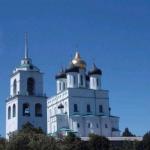Sights Pskov, Russia
 Pskov - a center of Russian national culture. In the vicinity of the city survived more than 120 monuments of architecture XII-XYII centuries. Even to this day very well preserved fortress in the fourteenth century Izborsk - rare in-a-kind monument fortress architecture. Three hundred years since the beginning of the thirteenth century to the beginning of the sixteenth century. Izborsk was a major Russian fortress, which took the blows of the Livonian Order. Its walls withstood dozens of fierce battles and sieges and the city earned the reputation throughout the stronghold of the Pskov and Novgorod. So far as the stately monument of military glory raised its mighty towers, bastions with unexpectedly affectionate names: Temnushka, brandy, Kukovka, tower, bell tower.
Pskov - a center of Russian national culture. In the vicinity of the city survived more than 120 monuments of architecture XII-XYII centuries. Even to this day very well preserved fortress in the fourteenth century Izborsk - rare in-a-kind monument fortress architecture. Three hundred years since the beginning of the thirteenth century to the beginning of the sixteenth century. Izborsk was a major Russian fortress, which took the blows of the Livonian Order. Its walls withstood dozens of fierce battles and sieges and the city earned the reputation throughout the stronghold of the Pskov and Novgorod. So far as the stately monument of military glory raised its mighty towers, bastions with unexpectedly affectionate names: Temnushka, brandy, Kukovka, tower, bell tower.Pushkin Mountains. For over 200 years this region (the Holy Mountain, Mikhailovskoye Trigorskoye, Peter) is inextricably linked with the name of Alexander Pushkin. Here, at the white stone walls Svyatogorsk convent, buried a poet. This bow to the memory of the singer of the Russian land come and come thousands of admirers of his poetry from all over the world.
Cathedral of Transfiguration Ser. 12 - beg. 20 centuries. The ancient monastery church - the center of the Christian Enlightenment in Pskov; erected placement Nifont prelate, who, apparently, belongs to the brilliant idea of the magnificent ensemble of frescoes Mirozhi made by the Byzantine artists in the mid-12 century. The frescoes, preserved in 80%, continuous carpet covering the walls of the temple - the world-famous cultural heritage.
In the west, 50 km from Pskov, Pskov-Pechora is acting monastery, founded back in 1473 - a unique architectural and historical monument. Monastery bell tower is decorated with bells, donated by the monastery Russian tsars, Ivan the Terrible and Peter I. Under Peter I the Pskov-Pechora monastery became one of the Russian monastery of national significance. Not just walls of the monastery to defend the Russian lands from the incursions of invaders. Slaven Pskov. Inexhaustible interest in its rich history, which, as in a mirror, reflected the history of the Russian state.
Stefanovskaya Church. 17. Built on the site of an ancient (1406), represents the refectory of the temple gate to the storeroom, which adjoin the Holy Gate.
Today's Pskov - a modern city with a lavishly landscaped streets, tracts of homes and public buildings, in an ensemble which includes an organic creation of the ancient nameless architects. A Pskov land, rich sources of medicinal waters and deposits are unique in their curative properties of mud, generously gives to people because of its fertile subsoil.